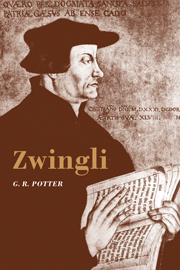Book contents
- Frontmatter
- Contents
- List of maps
- Preface
- Abbreviations used
- map The Swiss Confederation, c. 1515
- 1 Early years
- 2 Parish priest: Glarus and Einsiedeln
- 3 The Zurich ministry
- 4 The first rift
- 5 Road to independence
- 6 From argument to action
- 7 The radical challenge
- 8 Peasants, opposition, education
- 9 Reform and reaction
- 10 Berne intervenes
- 11 Zurich and St Gall
- 12 Zwingli and Luther
- 13 Marburg and after
- 14 Gathering storm
- 15 Precarious peace
- 16 The last year
- Index
3 - The Zurich ministry
Published online by Cambridge University Press: 13 October 2009
- Frontmatter
- Contents
- List of maps
- Preface
- Abbreviations used
- map The Swiss Confederation, c. 1515
- 1 Early years
- 2 Parish priest: Glarus and Einsiedeln
- 3 The Zurich ministry
- 4 The first rift
- 5 Road to independence
- 6 From argument to action
- 7 The radical challenge
- 8 Peasants, opposition, education
- 9 Reform and reaction
- 10 Berne intervenes
- 11 Zurich and St Gall
- 12 Zwingli and Luther
- 13 Marburg and after
- 14 Gathering storm
- 15 Precarious peace
- 16 The last year
- Index
Summary
The word Zürich (Tigurinum) had a double meaning at the opening of the sixteenth century. There was the city, exactly defined by its walls and defences; and there was the countryside with boundaries only marginally different from those of the twentieth century canton. Together they made up the Ort, state or canton, a highly developed political organism with a long tradition behind it. The inhabitants spoke their own Swiss-German dialect, not at all easily understood by a pure-bred German from Saxony or Hanover, different also linguistically from the usages of Basle, Berne and Lucerne.
There had been a Roman settlement where the Limmat flowed from the lake. Charlemagne was a legendary founder, patron and visitor; and his grandson, Lewis the German, set up and lavishly endowed a monastery for Benedictine nuns in 853. This was intended from its beginning to be a place of refuge for religious-minded aristocrats; and the abbess – the first one was the king's own daughter, Hildegard – ruled the little cluster of buildings which expanded steadily round the cloister. The convent owned much land, and the abbess had rights of jurisdiction over the tenants living thereon and also over the incipient market town. The church, known as das Fraumünster, several times rebuilt, was served by seven canons, who, with the nuns, constituted the chapter; and by chantry priests and preachers in the usual style of a collegiate church.
- Type
- Chapter
- Information
- Zwingli , pp. 47 - 73Publisher: Cambridge University PressPrint publication year: 1976



